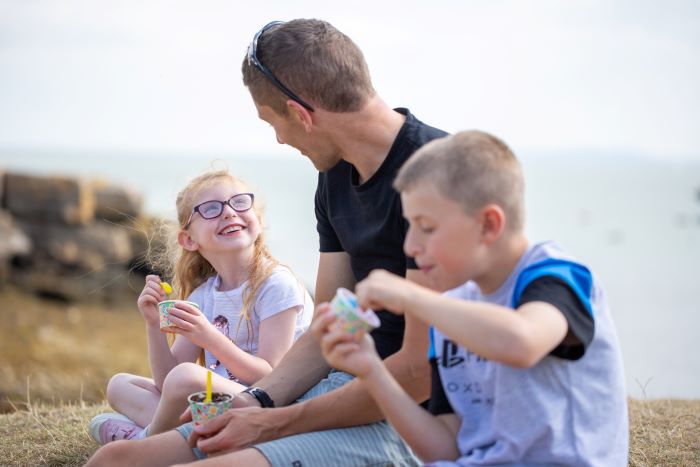
If you’re interested in the idea of becoming a foster carer, there is a lot to think about before making the plunge. And, if you love to travel, holidays within the UK and abroad are included. Read on to learn more about travelling while fostering.
can you take a foster child out of the country?
Yes, you can take a foster child on a holiday abroad.
But you’ll need permission from your local authority, and sometimes the child’s birth parents, first, before you book anything.
This can be a special experience for the whole family and a chance to spend some quality time together creating memories. Particularly for your foster child, if they haven’t travelled out of the country before. However, there is a lot to think about when planning a trip abroad with a foster child. In this blog, we’ll share some of the practical, and emotional things, you need to think about.
here are a few practical things to consider…
the planning
Choosing a holiday that everyone will enjoy, means finding somewhere that’s geared for the children’s ages, likes and dislikes, as well as the adults.
If the children are with you long term, you could ask them what they’d like from a holiday, and make sure some of their options were included in the final choice. This will help them feel that their opinion is valued and that they’re part of the process.
Involving them in the planning will also prepare them for the experience. It will give them an idea of what to expect and the trip will feel less daunting.
But how far in advance should you tell them about a holiday?
This will depend on the child. Not one size fits all. While some children might get excited about a holiday, change can heighten their anxiety. If it’s a weekend break, you could tell them a few days before or for a longer holiday, tell them a few weeks before.
sleeping arrangements
Like at home, sleeping arrangements should be carefully considered. But this could be a little trickier when at a hotel or holiday accommodation.
Discussing your plans in advance with your social worker will help to figure out how you will do this. Social workers can take a sensible approach and consider the practicalities of holiday plans which may differ from the usual living arrangements.
On a case-by-case basis, social workers can assess the risk of sharing a hotel room. For example, having a separate hotel room for young children, wouldn’t be safe or make sense.
Some children will be required to have their own bedroom when on holiday. This will depend on the individual needs of the child in your care. This may mean booking a holiday home, rather than a hotel to provide enough bedrooms for everyone.
Social workers may also ask about your plans for:
- Bathrooms
- Getting dressed
- Balconies
- Guard rails for bunk beds
- Car seats
- Finding the nearest health centre or hospital
- Adult supervision near swimming pools
This will enable the children in your care and the whole fostering household to enjoy family holidays while also protecting everyone involved against any potential risks.
Read more: What Are the Foster Care Bedroom Requirements in the UK?
passports
Your foster child may not have a passport or GHIC (Global Health Insurance Card), or you may have to request these documents from the birth parents via your social worker. It may take time to find and receive these essential travel documents or to apply for new passports before a break.
Travelling through airports can also be tricky when you have different surnames, and you may get questioned by security. You’ll need permission from your local authority to take the child out of the country, so make sure to print this letter out and take it in your hand luggage as evidence. This should make the process a lot smoother.
routine
Most foster children thrive on routine and stability, so a change in location could make them feel anxious and lead to behaviour changes. Where possible, maintain their routine with mealtimes and bedtimes. You may also wish to pack some of their favourite foods or toys, so they have familiar things that they know and love around them.
packing
Talking of packing, for children in care, this can be scary… even for a week in the sun. Packing a suitcase of belongings can bring back memories of being separated from their birth family or moving from one foster carer to another. Or your family may have some holiday ‘traditions’ that they are not familiar with – like buying new holiday clothes. As a result, this can take some time and be an emotional experience. Patience is key.
making memories
Going on holiday is a treat for everyone and you can make memories that last a lifetime while experiencing a new place together. So, make sure to take lots of photos while you are away.
When home, you can join your foster child in making a photo album or a scrapbook to create a keepsake they can look back on.
being flexible
While it’s good to research and plan some activities while you are away, this may be a new experience for your foster child, and it could be overwhelming. Children may show their feelings of instability through changes in behaviour or reverting back to previous behaviour patterns.
Flexibility is key in this case. Try to make plans that can be adapted, if needed.
price
Holidays aren’t cheap. And, while you will be provided financial support for every foster child in your care, this is unlikely to extend to cover the cost of exotic vacations. Therefore, if you want to take your family on a holiday abroad, you will likely have to cover some of this additional cost yourself.
Read more: Will I be Paid as a Foster Carer?
school term times
Schools in England and Wales typically have a two week holiday at Christmas and Easter, six weeks in the summer and week-long half terms in May and October.
Most schools only allow term-time absences in exceptional circumstances. The fines are £60 per parent, which will rise to £120 each if not paid within 21 days.
As a foster carer, you also need to consider that children may have missed out on some of their education and, despite myths about children in care, many of our children actually love going to school. School is an important part of a child’s routine and taking children on holiday during term time could disrupt that.
Most local authorities will ask that trips are booked in school holidays. So, before you book a cheaper term time break, best to check with the child’s school and your local authority.

can you travel within the UK with a foster child?
Of course, not all holidays are abroad. There are many great parts of the country to explore and fun things to do just a few hours away. And, taking your foster child with you on a staycation can be a wonderful experience.
In fact, a UK break may be preferred if you have recently welcomed the child into your home and they’re still getting situated. By remaining close to home, you can provide a sense of security for the child and you will also have support nearby should you need it.
We love caravan holidays! They can become a second home away from home and you can take much more luggage than on an airplane. Whether it’s a foster child’s duvet, toys, favourite food and drink, or even the family pet, your only restriction is the size of your car boot.
Day trips can also be fun! And you won’t have to spend the night away. We love a trip to the seaside, but there are also some great theme parks in the UK, lots of historic sites to explore, and a theatre show is always a treat.
Whether a day trip, caravan holiday, or a stay somewhere else in the UK, not as much advanced planning is required as with an abroad trip. No passport or permission is needed either. So, if you want to book at short notice to minimise fuss or because you don’t know how many people will be coming, you can!
what if we have already booked a trip?
If you have already booked a trip, then this shouldn’t stop you from fostering. In many instances, you can add the child to your plans.
Most parents enjoy a child-free weekend away, maybe for a wedding anniversary, or have family support during the school summer holidays. This is the same for foster carers.
Family members can be approved to provide regular care. Other foster carers, who ideally know the children already, can also offer some support, like a foster aunt or uncle.
However, we don’t encourage long trips away without your foster children. While we understand that you may want some time away without children to relax and spend time with your partner or friends, leaving a child behind or ‘taking a break’ can be upsetting and leave a foster child feeling like an outsider.
In this case, you may prefer to offer short-term care, with child-free breaks in between, rather than long-term fostering.
Read more: can I foster part time?
thinking of becoming a foster carer?
Holidays aren’t a barrier to fostering. But, there are practical considerations to make. Learn more about this by speaking to a friendly face at your local authority foster service. Let’s make a difference, together.

